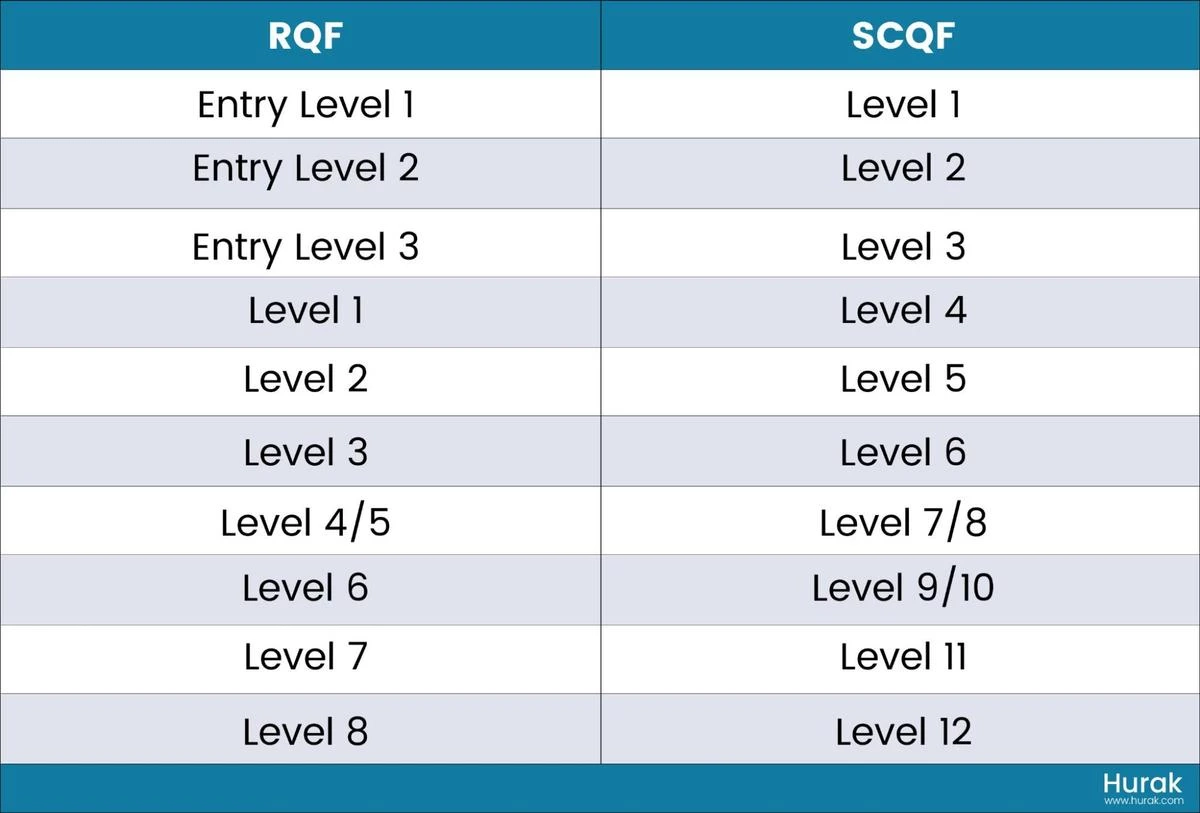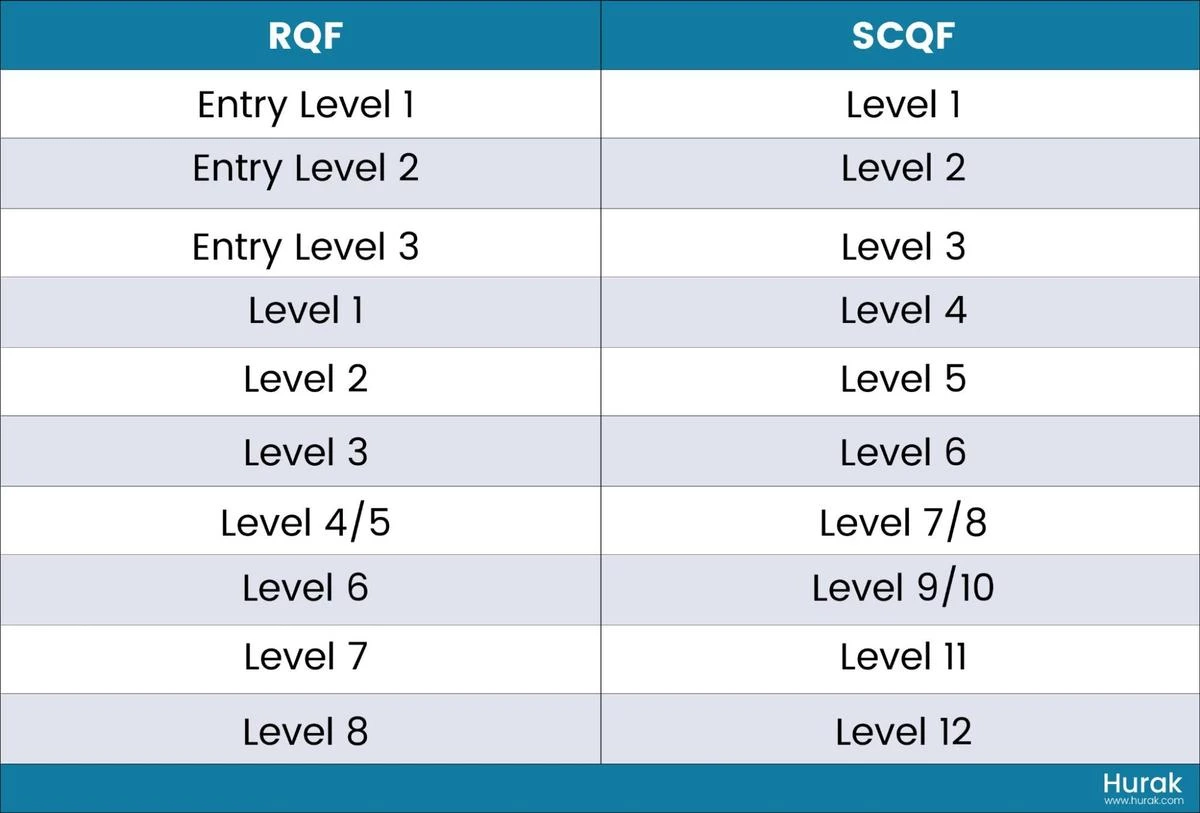RQF, short for Regulated Qualifications Framework, is a nationally recognised system. It governs qualifications in England, Wales, and Northern Ireland.
The primary goal of the RQF is to establish an adaptable educational framework throughout these regions. In other words, it ensures consistency and facilitates mobility.
What Do the Different RQF Levels Represent?
If you take a look at a certificate for an RQF qualification, you’ll see a number displayed alongside the qualification title, such as Level 2.

This numerical value indicates the qualification’s difficulty level, and as the level increases, so does the complexity of the content, requiring learners to allocate additional time to complete the qualification.
The RQF consists of 8 primary levels, along with 3 additional entry levels. Here is a table that compares these RQF levels to their corresponding certificates:

Understanding the equivalent qualifications at each RQF level is crucial. This understanding allows you to effectively compare the qualifications you’re pursuing, be it awards, certificates, or diplomas. However, it’s equally important to assess suitability when determining the most appropriate RQF level for your goals.
Entry Levels: These levels are typically not mandatory or required by organisations as they provide only basic knowledge. They are suitable for individuals entering a new field.
RQF Level 1: The RQF Level 1 marks the initial step towards formal recognition of your knowledge across England, Wales, and Northern Ireland. It caters to learners aged 15-16 and offers foundational knowledge.
RQF Level 2: Building on the previous level, RQF Level 2 takes it a step further. It covers the basics of the subject as well as additional modules. It is suitable for learners aged 15-16.
RQF Level 3: At this level, you become a specialist in your chosen subject area. It implies that you have covered the basics and have taken a more in-depth approach to learning.
RQF Level 4: This level is equivalent to the first year of a bachelor’s degree, representing a step up from secondary level content.
RQF Level 5: RQF Level 5 acts as a preparatory stage for individuals planning to pursue a Level 6 qualification. It builds the essential groundwork to move beyond secondary education.
RQF Level 6: Equivalent to a 3-year bachelor’s degree, RQF Level 6 is intended for learners aged above 19.
RQF Level 7: Corresponding to a master’s degree, RQF Level 7 takes the subject matter to a deeper level of understanding.
RQF Level 8: RQF Level 8 represents the highest achievement in England, Wales, and Northern Ireland, indicating a doctoral-level qualification in your subject.
What Are Credits and How Do They Affect RQF Qualification Durations?
Each qualification is assigned a specific number of credits, with each credit generally representing 10 hours of learning. By multiplying the number of credits by 10, we can estimate the Total Qualification Time (TQT) for a course. For example, if a course has 12 credits, its TQT would be around 120 hours.
For instance, a course might have a core duration of 40 hours, but if it involves additional time for completing assignments and assessments, these hours are also factored into the estimated TQT. On the other hand, Guided Learning Hours are distinct and only account for the time spent under the direct supervision of a lecturer or a training body.
Putting in a mathematical form,
Total Qualification Time (TQT) = Guided Learning Hours (GLH) + Directed Learning Hours + Assessment Hours
What is the Difference Between RQF and SCQF?
In England, Wales, and Northern Ireland, the Regulated Qualifications Framework (RQF) is followed. On the other hand, Scotland has its own Scottish Credit Qualification Framework (SCQF).
The RQF starts with 3 entry levels and goes all the way up to level 8, which is the highest attainable level. On the other hand, the SCQF doesn’t have any entry levels and starts simply from Level 1, going up to a total of 12 levels.
To make it clearer for you, here’s a comparison table showcasing the RQF and SCQF levels.

What is the Difference between an Award, Certificate, and Diploma?
It’s essential to understand that within the context of regulated qualifications, the terms “award,” “certificate,” and “diploma” serve as key indicators for the level and depth of knowledge and skills acquired by a learner. An award is typically the shortest and represents a basic level of competence or understanding in a particular subject area. Typically it takes up to 13 credits or 130 hours to complete. Moving up, a certificate, being more extensive, points to a broader and deeper level of proficiency. Certificates require learners to go through 13 to 37 credits, equivalent to approximately 130 to 370 hours of study. A diploma, the most comprehensive of these distinctions, indicates a high degree of expertise, often requiring a more extended study period. Diplomas extend beyond 37 credits or roughly 370 hours.
While duration frequently correlates with the qualification level, these terms primarily convey the depth and complexity of learning and the resulting skill set rather than being solely linked to the length of the programme.
Frequently Asked Questions (FAQs)
Are RQF levels recognised throughout the UK?
No, these levels are not recognised across the entire UK. RQF Levels are applicable in England, Wales, and Northern Ireland, while the SCQF is used in Scotland.
What is RQF Level 6 equivalent to?
RQF Level 6 is equivalent to a bachelor’s degree.
What do RQF levels mean?
The levels indicate the complexity of the qualification. The higher the number goes, the more complex it gets.
What does “size” mean?
The size of a qualification is simply the time it takes to complete the course content.
Summing it up
I hope that this blog has provided you with a better understanding of RQF qualifications. Keep in mind that the various RQF levels are indicators of a qualification’s level of difficulty, and each credit typically represents approximately 10 hours of learning. Awards are typically the briefest, requiring up to 13 credits to complete, while certificates involve 37 credits. Diplomas typically take the longest to finish and may extend beyond 37 credits.
With an extensive range of over 500 regulated courses, don’t wait; secure your place today by booking or giving us a call to explore how we can jumpstart your career.




